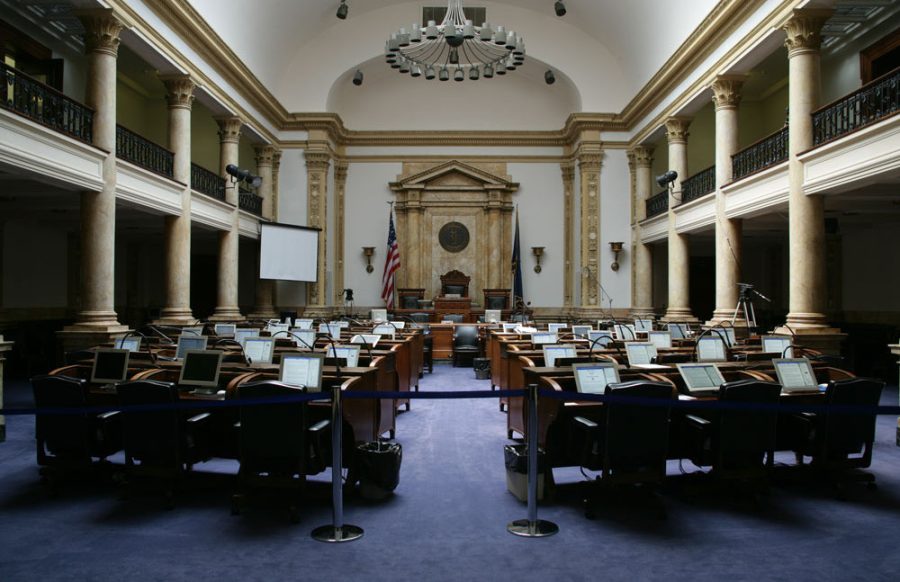What Should the Role of Government Be in the Classroom?
Why You Should Care About Kentucky Senate Bill 1.
Kentucky Senate Chamber
Last month, the Kentucky State Senate passed SB1, an education bill covering various aspects of public schooling in the Bluegrass. The bill draws on various bits and pieces of other recent bills, most notably SB 138, known as the “Teaching American Principles Act.” This latter act drew criticism from Kentucky educators and social studies advocates, as it aimed to restrict curriculum standards defined by the bill as “inconsistent with designated concepts,” related to race, gender, and sexuality.
Let’s break that down a bit…
“Senate Bill 138 was an attempt by the senate to, at least on the surface, protect students’ ability to express their own opinions in class,” said Ryan Lewis, teacher and Social Studies Department chair. “It does go a bit further though, attempting to define how we should talk about controversial issues.” Some of the language from 138 talks about how students should not be made to feel guilty for the actions of other members of their own race. This fear of student guilt echoes several other bills made in other states, made in response to race-related protests over the past two years. “In the bigger context of what is going on in the United States, this bill comes at the end of a process of a lot of other states adopting very similar bills,” Lewis said. “And so there is a big question of are we actually trying to push this bill through because we feel like there is an absolute student need for it?”
Though SB138 would go on to “die” in the Kentucky House of Representatives, its main clauses live on, tacked onto SB1 in House Amendment 5. SB1 is known as an “omnibus bill” meaning it concerns a variety of issues under the umbrella topic of public education. For example, much of SB1 deals with School Council procedures and writing programs, as well as giving County Superintendents the power to appoint principals with the advice of the school board (sound familiar anyone?) by attaching the failed bill to the newly furnished SB1, the core tenants of the “Teaching American Principles Act” were able to pass in both houses, with a Republican “super-majority” (over three fourths) overriding a veto from Governor Andy Beshear. In his veto message to the state Congress, Beshear claimed SB1 represents a “step backward for public education in the Commonwealth,” citing the need for students and adults to have important discussions “free from government censorship.”
Several Woodford County teachers have taken issue with the rhetoric of this bill.
SB1 House Amendment 5 charges Kentucky school administrators with curbing any instruction meant to “advocate, inculcate, or promote bigotry, revisionist history of America’s founding, or critical social justice.” The bill does not go into specifics, and it is this legislative vagueness that has Social Studies and Language Arts teachers wary. “The way it’s been written would make it difficult to talk about any kind of equity experiences for students,” said English teacher Renee Boss. “That’s obviously troubling because students’ lives matter and that’s why we do what we do.” Because the language of the bill is so unspecified, Boss worries it could have a negative effect on teacher/student trust. “If we can’t even talk about the issues that matter to our students with our students, that makes it difficult to build relationships and to even teach content.”
WCHS English teacher and Gay-Straight Alliance sponsor Amy Schwarz brought similar concerns. “My concern is frankly less about the teachers and more about the students,” Schwarz told Jacket Journal staff. “Any time you start to get a group of people from outside the school system who tell you what you can or cannot address in class, it really starts to limit open discussion, free thought, and really the ability to respond to student questions.”
“What’s concerning is that they are not trusting the trained professionals,” said fellow English teacher Laura Benton. “Every teacher in this building and all respective buildings throughout the state have training within their own individual content…and when you start dictating curriculum, you are robbing us as educators of the ability to make the best decisions we can for our students.”
WCHS students have also voiced concerns.
Some Woodford students have responded negatively to SB1 and its passage. “As someone who wants to be an educator in the future, it’s very disappointing that we are going backward,” one WCHS junior told The Jacket Journal. “An educator’s job is to inform their students on what has happened in the past, and the only way not to repeat the past is to learn about it.”
Conner Brumley, WCHS sophomore, also took issue with the bill. “When you are having a set curriculum (…) basically you are putting students into a standardized classroom environment, which is obviously not beneficial for anyone.”
“From my perspective, the correct role of elected officials in making curriculum is none,” wrote another WCHS junior. “Why would Kentucky entrust Senators, who haven’t stepped foot within a Kentucky school, to make sweeping changes within education instead of listening to teachers who are actively serving within the system? Trust that the educators within Kentucky, responsive individuals who are directly involved within schools, along with those at the Department of Education, can make their own decisions about curriculum without political intervention.”
Some time ago, The Jacket Journal sent out a Google Form to the WCHS school body asking for their thoughts related to SB1. You can view the results of that form here.
Interested in reading SB1 for yourself? The full text can be accessed here.

Joseph is a WCHS Senior, and returning editor and staff reporter for The Jacket Journal. An avid cellist, he participates in Woodford's Chamber Orchestra...











